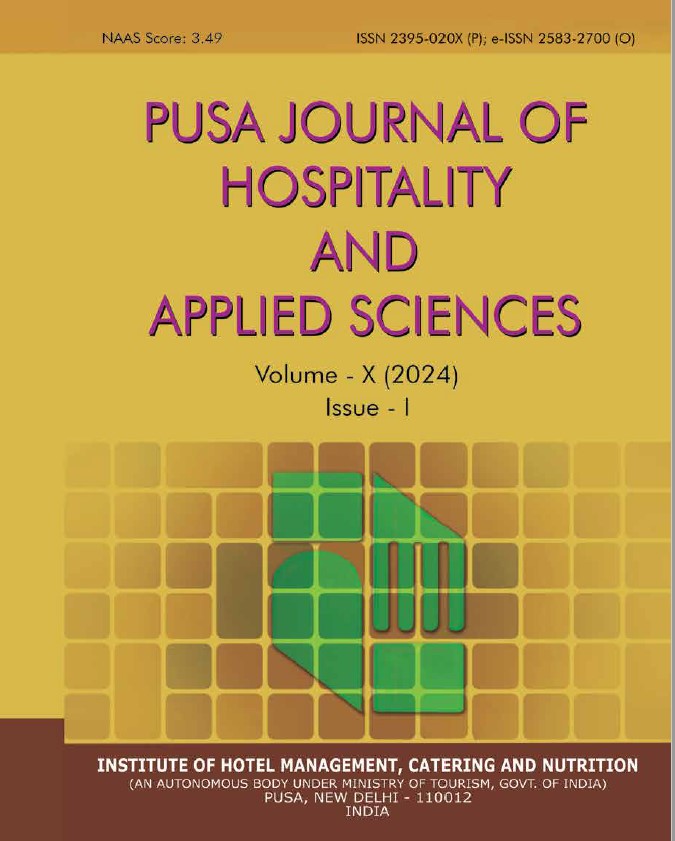Changing Fast Food Trends Of People
Keywords:
Fast food, Restaurant, Dispensable income, Globalization, Western CultureAbstract
Background: The concept of ready-cooked food for sale is closely connected with urban development. Fast food is the term given to food that can be prepared and served very quickly. Fast food industry is one of the world’s fastest growing sectors in food industry. Fast food is the food item that can be prepared and served very quickly. Food served in fast food restaurants is offered from a limited menu; it is cooked in bulk in advance and kept hot ,as there is an order for the dish it is finished and packaged accordingly or available for ready to take away, or even can be served in the restaurant. Objective: To determine the reasons for emergence of fast food, To find out the changes in eating trends of people in the age group of 20-30 years, To evaluate the health effects of fast food. Methodology: A Questionnaire was made and filled up by people in the age group of 20-30 years randomly to check the likes, dislikes and some more questions were asked related to the fast food and health hazards. Results:More fascinated to western culture and increase in the offers made by the fast food outlets the frequency of the young people visiting the fast food outlets has increase over the years. The frequency of their visits also depends on the dispensable income available with them. Some of them are aware of the long term health hazards of the fast food. Conclusion: From the whole study, we can conclude that fast food has really evolved and it’s here to stay. Factors such as globalization and busy life schedules have largely contributed towards their growth.
References
Anil, S., Kashyap, M., & Kashyap, K. (2013). A Study of Growth of Fast Food Industry with Reference to Shift in Consumer’s Buying Habits in Nagpur City. International Journal of Application or Innovation in Engineering & Management, Special Issue for National Conference On Recent Advances in Technology and Management for Integrated Growth, ISSN 2319 – 4847.
Chinnudivakar (2009). Fast Food Industry in India. https://www.scribd.com/doc/19018679/ fast-food-industry-in-india-a-study.
Dholakia, U. M., & Talukdar, D. (2004). How social influence affects consumption trends in emerging markets: An empirical investigation of the consumption convergence hypothesis. https://doi.org/10.1002/mar.20029
Goyal, A., & Singh, N.P. (2007). Consumer perception about fast food in India: An exploratory Study. British Food Journal, 109.
Iqbal, Z.M., Saif, S.A. , Aysha C.,& Atif R.,(2009).Consumer behavior towards fast food. Retrieved from http://psfst.com/jpd_fstr/eb5d4181d750ced06632d9c378c95e63.pd
Kotler (2009), Model Of Consumer Behavior. Marketing Management (12 th eds.), new jersey, pearson prentice hall, 184) https://www.researchgate.net/figure/model-of-consumers behaviour-source-kotler-and-keller-2006-marketing-management_fig3_23543281
Sarda, A., Kashyap, M., & Kashyap, K. (2013), A Study of Growth of Fast Food Industry with Reference to Shift in Consumer’s Buying Habits in Nagpur City. International Journal of Application or Innovation in Engineering & Management (IJAIEM), Special Issue for National Conference On Recent Advances in Technology and Management for Integrated Growth 2013 (RATMIG 2013).
Webster Merriam, (1951), https://www.merriam-webster.com.
Sengupta, P.P., Mishra, R., & Battacharya, S., (August 2011). Exploring customer loyalty: A study on fast food outlets in the city of Chennai. International Journal of Multidisciplinary Research, 1(4), ISSN 2231 5780.
Ashakiran, S., & Kiran, D. (2012, January). Fast foods and their impact on health. Journal of Krishna Institute of Medical Sciences University, 1(2), 7-15. https://www.researchgate. net/publication/285169531.
Prabhavathi, Y.N.T., Kishore, K., & Kumar, M.R. (February 2014). Consumer Preference and Spending Pattern in Indian Fast Food Industry. International Journal of Scientific and Research Publications, 4(2), ISSN 2250-3153.




